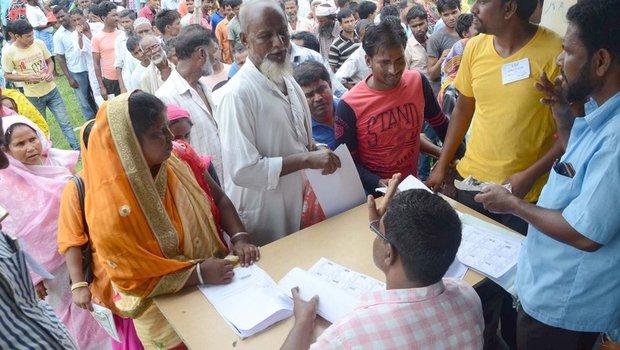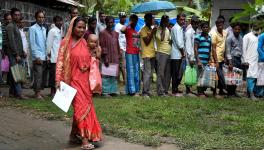Mr Shah, Show Us Numbers of Refugees Seeking Citizenship: Mridula Mukherjee

Image Courtesy: Telegraph India
Mridula Mukherjee is a noted historian and former director of the prestigious Nehru Memorial Museum and Library. Speaking exclusively to NewsClick on the fallout of the amended citizenship law, particularly on the northeast, she says, “The present government has no experience of the northeast. They have never handled such a situation before, especially where ethnic divides are so sharp.”
Some would say that the legacy of Partition is haunting us through the amended citizenship law. Home Minister Amit Shah has even claimed in Parliament that the partition of India, in 1947, was along religious lines and that he was introducing the amendment to the 1955 citizenship law to provide refuge to persecuted minorities (except the Muslims) in the three neighbouring nations, of which Pakistan and Bangladesh bear the legacy of Partition?
The Home Minister’s attempt to link CAB to the partition of India is pure rhetoric. CAB has nothing to do with Partition. Victims of Partition moved into the country several decades ago, and they are all well-settled in their respective areas.
Yet, in the wake of the new law, an all-India NRC (NRIC) is literally breathing down the neck of millions of Indian citizens?
My own understanding about their claim to create a nationwide National Register of Indian Citizens (NRIC) is that it is mere rhetoric; and part of their agenda to polarise and divide different communities. They aim to threaten and browbeat people. Their real objective is to find a way to legalise [grant citizenship to] the large number of Bengali Hindus who have got excluded from the NRC in Assam. I have been hearing and reading different estimates of how many of the total 19 lakh or so who were excluded in the Assam NRC are Hindus. One estimate is that 12 lakh Hindus have been excluded, of whom two-thirds may be Bengali-[speaking Hindus from Bangladesh or West Bengal].
Is that why the BJP has suddenly turned against NRC?
Thousands of people were involved in conducting the NRC exercise in Assam, and it has misfired for the Bharatiya Janata Party [BJP]. This is because while the majority of those excluded have turned out to be Hindus, in the rhetoric it used, the BJP had kept on insisting that a majority of immigrants in Assam are Muslims. But the Assamese people have maintained all along that their fight is not against Bengali Muslims or Bengali Hindus. They simply do not want to be swamped by Bengali infiltrators, whether from Bangladesh or West Bengal.
The Assam issue goes back to the 1920s. It was a low-population area at the time, a labour-short province and a land of abundance. Assam included the seven sisters and was part of the British Residency. The British brought in people from Jharkhand to work here. Assam has always had a checkered history of migration. The Assam movement started in the seventies, and by then the population of migrants had started to swell and the anti-migrant sentiment began to harden within the state.
But the common man is now asking how exactly the NRC will be implemented throughout the country, as the Home Minister says will happen?
The politics of the BJP is to keep NRIC hanging over the heads of Indian Muslims. I feel they may try it in one state or another. But to think they can implement the NRC on a population of 1.33 billion is an impossible task. To do so will mean that every Indian will have to go and get registered. Its practical aspects are very difficult to implement. They have never spelled out just how they will conduct such a massive exercise. Their aim is only to polarise Indian politics.
What exactly is the number of refugees that have migrated into India, and why are refugees from only three neighbouring countries, Afghanistan, Pakistan and Bangladesh, that to who belong to specific religions, being considered?
The government claims that two to three lakh people have sought refuge in India. Who are these people? Where are they? The figure given by the Investigation Bureau to the Joint Parliamentary Committee is of around 31,000 migrants, of whom around 24,000 are Hindu and 5,000 are Sikh.
During the Taliban regime in Afghanistan, which was a good twenty years ago, everyone suffered in Afghanistan, including the Sikhs. Many Sikh families left the country at the time. But all these issues can be handled at a bureaucratic level, why make it a big political issue... The Karnataka government went after illegal immigrants and found around 500 Bangladeshis settled in Bangalore. Will all those people be sent to detention camps? What will happen to their children? In a country with much internal migration, the question to be asked is who will keep track of all these people. One detention centre is being built at the cost of Rs 40 crore to house 1,000 people. Look at the costs of this exercise on a national scale.
There is a perception that the aim of the changed citizenship law and the NRIC is actually to polarise West Bengal.
Yes, there is no doubt about that. They want to communalise West Bengal. The rebellion in East Pakistan had seen large numbers of refugees, both Hindu and Muslim, move into India to escape the atrocities committed by the Pakistan Army. The BJP believes that by granting citizenship to a few lakh Hindus who have settled there [in West Bengal], they will create a grateful citizenry that will be their permanent votebank. Along the India-Bangladesh border, there are enclaves from where there is a constant to-and-fro of people, of both countries, for one reason or another. But this is very different from stating that West Bengal is harbouring Bangladeshi infiltrators. Migration has happened here for political and economic reasons.
What consequences do you foresee from the implementation of the amended Citizenship Act?
I must point out that both Tripura and Assam, in fact, the whole of the northeast, is a very sensitive region in terms of national security. It took seven decades to calm the situation there. It is like sitting on a powder keg. You don’t mess with these states.
Did the Modi government not apprehend the fallout of their actions?
There are so many ethnic groups in the northeast that harbour deeply felt animosities against each other. These will not go away. The problem is that the present government has no experience of the northeast, they have never handled such a situation before, especially where ethnic divides are so sharp. Assam is burning. In Tripura, indigenous peoples are angry with the Bengali[-speaking] majority. Tripura is almost inside the belly of Bangladesh... How can you call yourself a nationalist country if you do not worry about the nation? They [the Modi government] is not protecting the nation. They do not understand genuine mass movements because they have never been part of one.
They blame the Congress, saying it is responsible for the Partition of India?
This is a travesty of the truth. It was the long-time policy of the British to divide and rule. They fostered divisions within India along religious lines. It was the Muslim League which had wanted a Partition. The Congress party fought against the British and it fought communal forces and the divisive agenda of the Muslim League. But the Congress had no choice, as Partition was imposed upon them. With the Muslim League being given a veto, and with communal violence spreading, it had to acquiesce. Also, the two-nation theory was first expounded by the founder of the Hindutva ideology, VD Savarkar, in 1937.
Are you saying that the BJP has fallen prey to its own rhetoric?
Nothing drastic happened in the last five years for them to [seek to] introduce a new citizenship bill. Also, the economies and social indicators of our neighbouring countries show that they are doing better than us. Why would people from there want to come to India? There has been no exodus during the last decade or so. The issue before the BJP government was how it can connect their citizenship law to Assam. Assam’s NRC report hit them hard because they had never anticipated that so many Bengali Hindus would be excluded. They had believed their own lies. The NRC coordinator Prateek Hajela did an honest job, the result was he was thrown out.
How will they justify it, if we put all those Hindus in detention centres? Therefore, they have brought in the amended law on citizenship. But from the start my question to the Home Minister, Mr Amit Shah has been: give us the numbers. Please show us their letters, the number of applications they have received from refugees asking for citizenship. Put all these details in the public domain. All this is hogwash. They [the Sangh and BJP] are experts at creating myths and lies. They should have known this was going to happen. They are putting the entire nation at stake. Kashmir and Assam have always been two difficult areas—it has taken a lot to keep them there [within India].
I must also emphasise that in Assam, the NRC asked for a whole series of documents. If a surname was spelt wrong, the individual would not be registered. My point is that we already had the Census of India, there are ration cards, voter identity (ID) cards and the Aadhaar; there were so many ways to have counted people. Aadhaar had worked because it required one ID proof for the applicant to receive his unique Aadhaar number. What is happening now is ridiculous. If you don’t have the documents, you become a non-citizen.
The Bangladesh Foreign Minister has cancelled his trip to India. What could be the reason?
We have been reduced to a ridiculous place. Earlier, we were proud of our secular credentials, that we were a diverse and vibrant democracy. That space has been taken away from us.
Get the latest reports & analysis with people's perspective on Protests, movements & deep analytical videos, discussions of the current affairs in your Telegram app. Subscribe to NewsClick's Telegram channel & get Real-Time updates on stories, as they get published on our website.
























